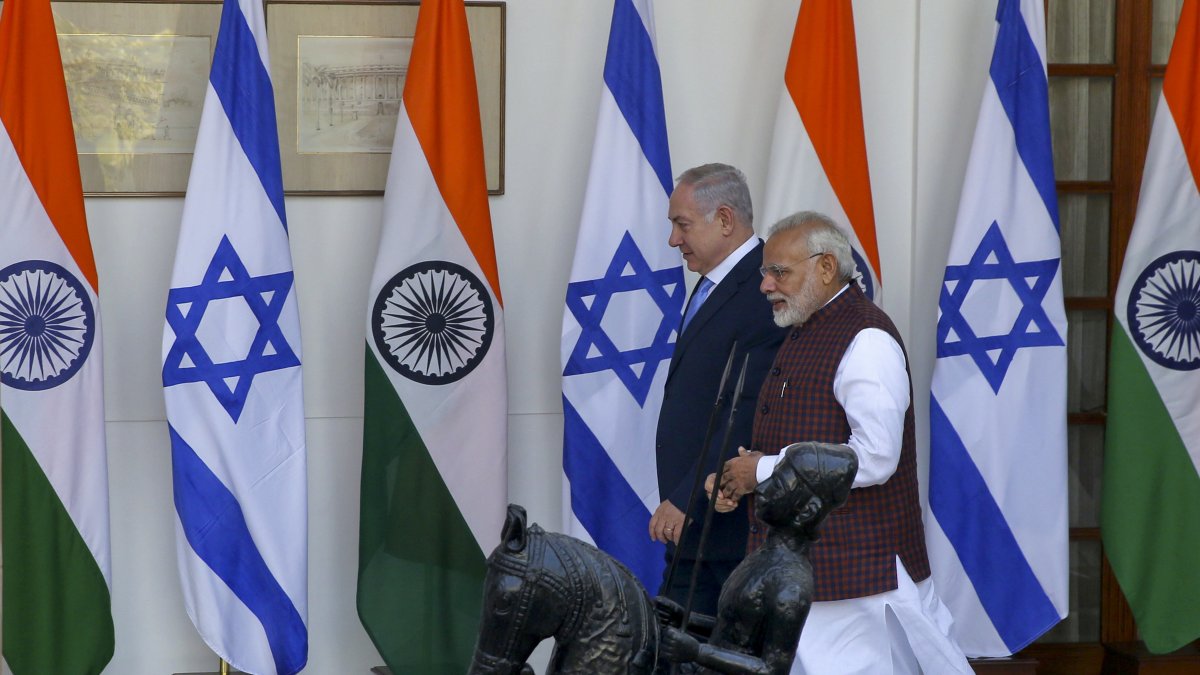Bridges, not blocs: The imperative for a new Indian foreign policy
Source: DAILYSABAH
In mid-June 2025, during Indian Prime Minister Narendra Modi’s official visit to the Greek Cypriot administration, he was seen standing alongside Greek Cypriot leader Nikos Christodoulides, symbolically gazing across the dividing line toward the Turkish Republic of Northern Cyprus (TRNC). This sight mirrors two historic photographs etched in memory, emblematic of two vastly different eras in India’s political evolution. The first, Palestinian leader Yasser Arafat embracing Indian Prime Minister Indira Gandhi in a bear hug, affectionately calling her his “sister,” likely during the 1983 Non-Aligned Movement (NAM) summit in New Delhi. The second, captured over three decades later, depicts Indian Prime Minister Narendra Modi clasping Israeli Prime Minister Benjamin Netanyahu tightly to his chest, a moment seemingly choreographed to signal a tectonic shift in India’s foreign policy and political ethos.
So, what brings Modi to to this geopolitically sensitive corner of the Mediterranean in June 2025? And what message is he sending with this carefully crafted symbolism?
Israel-India-Greece trio
Modi visited the southern part of the divided island in June 2025, immediately after a brief but intense four-day conflict with Pakistan. During the escalation, India’s hyper-nationalist media criticized Türkiye for siding with Pakistan, accentuating Ankara’s consistent diplomatic support for Islamabad. Modi’s visit, just days after the confrontation, was no coincidence. His engagements in Lefkoşa (Nicosia), including discussions on enhanced defense and economic cooperation, formed part of a broader strategy to build alliances aimed at counterbalancing what New Delhi perceives as a hostile strategic nexus.
India’s newfound relationship with Israel, which practices a policy of pre-emptive military dominance, aligns with New Delhi’s increasingly assertive security posture. Modi’s 2017 visit to Israel, the first ever by an Indian prime minister, proved to be a harbinger of a decisive shift in Indian foreign policy, away from its historic non-alignment toward overt strategic alignment with powers that share its adversarial view of Pakistan.
For that matter, India’s growing engagement with Greece and the Greek Cypriot administration, actors harboring longstanding tensions with Türkiye, a vocal advocate for both Palestine and Pakistan, signifies a more confrontational regional stance, modelled on Israel’s posture of deterrence and dominance.
Modi’s 2023 visit to Greece, the first by an Indian prime minister in four decades, was in a way a precursor to the process of bloc building. This trip set in motion a strategic partnership encompassing defense cooperation, maritime security and economic ties. His visits to Greece, the Greek Cypriot administration and earlier to Israel shape an emerging trilateral axis aimed at counterbalancing the Türkiye-Pakistan partnership.
India’s outreach to Greece and Israel is a carefully calibrated strategic realignment. Türkiye’s close ties with Pakistan, India’s principal adversary, are seen in New Delhi as justification for cultivating countervailing alliances. For Greece, historically at odds with Ankara, and for Israel, whose military assertiveness resonates with India’s own evolving doctrine, these relationships offer both practical and symbolic value.
What emerges is a pattern of grievance-driven diplomacy. India, once a champion of non-alignment and civilizational dialogue, appears increasingly drawn to a new geopolitical logic: one that prioritizes hard power, deterrence and strategic posturing over regional cooperation.
What is India’s goal?
What we are witnessing is a dangerously self-reinforcing cycle: War-making is increasingly employed as a tool to consolidate majority-based ultra-nationalism, often flirting with the contours of fascism, all in service of narrow, parochial interests tied to electoral gains. In turn, this aggressive nationalism fuels further militarization, manufacturing the illusion of invincibility. It is a feedback loop in which war feeds nationalism, and nationalism, in turn, demands more war. This is not strategy; it is a descent into a politics of destruction, where statecraft is reduced to spectacle, and military adventurism becomes a means to capture and retain power. For a country as vast and diverse as India, such a trajectory is not only morally corrosive but strategically perilous.
Sustaining a war machine and aspiring to regional dominance is an immensely costly pursuit, particularly in an era of high-tech, resource-intensive warfare. Modern military doctrine recognizes a critical asymmetry: holding a defensive line may require one soldier, but sustaining offensive operations demands at least four. This imbalance extends beyond manpower to encompass long-term economic viability.
India may today rank as the world’s fourth-largest economy in terms of absolute GDP, an impressive achievement. But when disaggregated, the picture becomes more sobering. With a per capita income hovering around $2,500, India ranks below the 130th position globally, behind countries like Sri Lanka, Indonesia and even war-torn Ukraine. The inequality is stark: the top 1% of Indians control over 40% of the nation’s wealth, while hundreds of millions continue to live with precarious access to health care, education and essential infrastructure.
India’s immense diversity has long been its greatest strength, but if internal fault lines are allowed to deepen under the weight of rising majoritarianism, that same diversity could just as easily become its Achilles’ heel. Critics often declare, “India is not Israel,” a statement heavy with implication. Israel, a small, highly securitized state, has survived through strategic isolation, bolstered by military superiority and a siege mentality. India, in contrast, is too large, too diverse and too interwoven with its neighborhood to emulate such a model. Its expansive geography and pluralistic demography, potentially a source of unmatched strength, may instead become an unmanageable liability if the state succumbs to a fortress mindset.
India’s evolving foreign policy, driven by grievance and military calculus, appears ill-suited to the realities of South Asia. Its pursuit of regional dominance remains largely shaped by unresolved tensions with Pakistan, a nation it cannot simply wish away. Yet rather than seek a political settlement to this enduring rivalry, India seems trapped in a zero-sum paradigm, forging defense-heavy alliances while sidelining the urgent imperative of peace. The spectacle of power projection may serve immediate electoral optics, but it cannot substitute the hard, patient work of regional reconciliation.
India is not Israel – more importantly, it cannot afford to be. If it continues down this path, it risks becoming a security state locked in perpetual hostility, eroding the very moral and civilizational ideals it once aspired to uphold. India needs to build bridges and not blocs.
The original article: belongs to DAILYSABAH .


